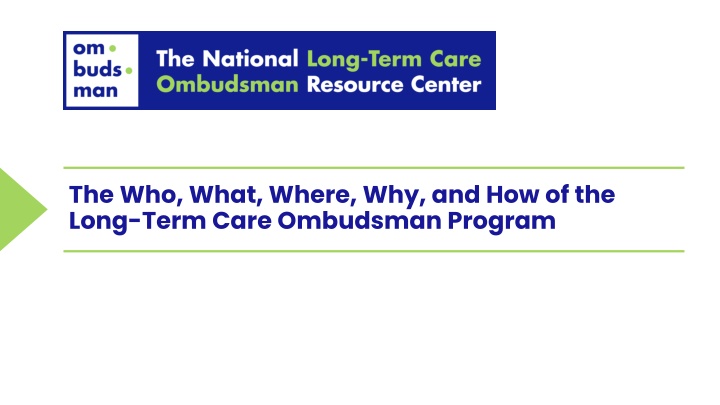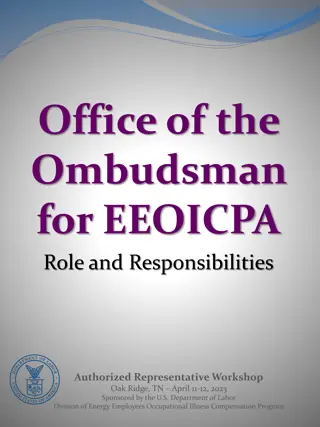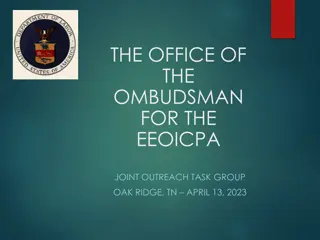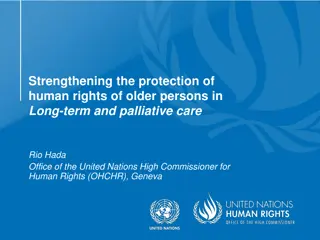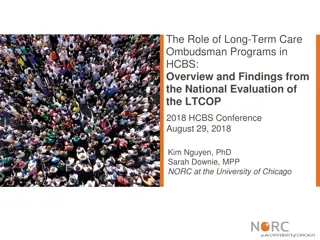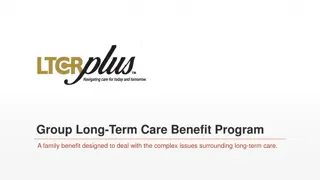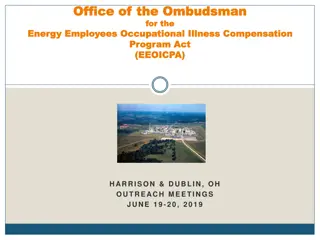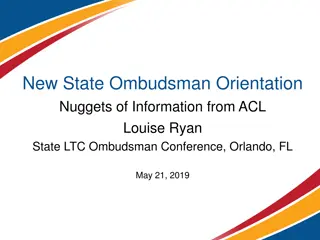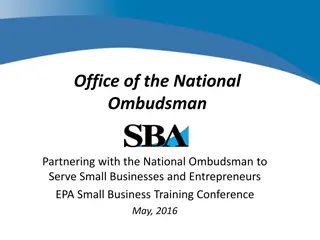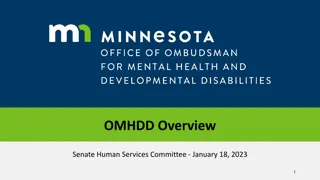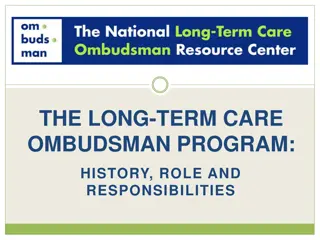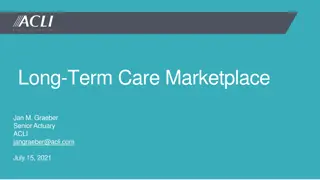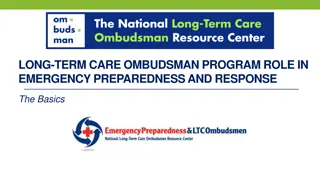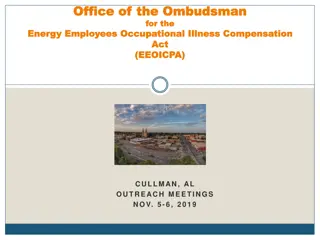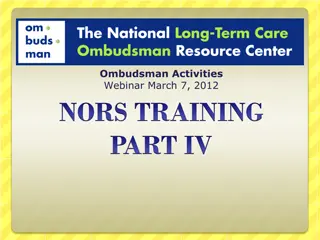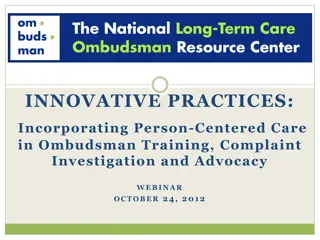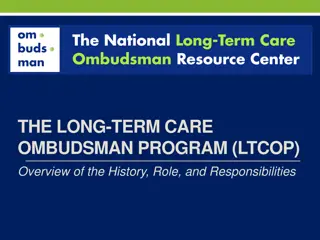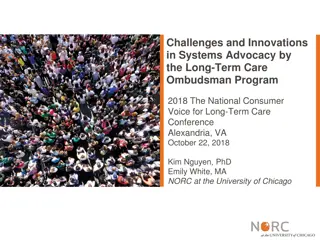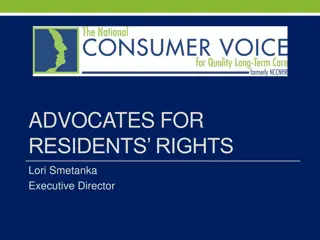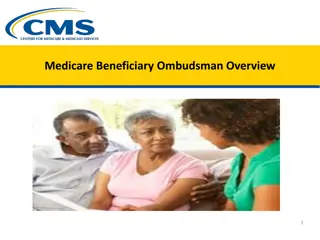Long-Term Care Ombudsman Program
This insightful content delves into the Who, What, Where, Why, and How of the Long-Term Care Ombudsman Program. It provides a comprehensive understanding of the program's purpose, role, and significance in ensuring the well-being and rights of long-term care residents. By exploring key aspects such as advocacy, support, and resolution of issues, this resource offers valuable information for anyone involved or interested in long-term care services.
Download Presentation

Please find below an Image/Link to download the presentation.
The content on the website is provided AS IS for your information and personal use only. It may not be sold, licensed, or shared on other websites without obtaining consent from the author.If you encounter any issues during the download, it is possible that the publisher has removed the file from their server.
You are allowed to download the files provided on this website for personal or commercial use, subject to the condition that they are used lawfully. All files are the property of their respective owners.
The content on the website is provided AS IS for your information and personal use only. It may not be sold, licensed, or shared on other websites without obtaining consent from the author.
E N D
Presentation Transcript
The Who, What, Where, Why, and How of the Long-Term Care Ombudsman Program
What is NORC? Funded by the Administration on Aging/Administration for Community Living grant Operated by the National Consumer Voice for Quality Long-Term Care (Consumer Voice) in cooperation with ADvancing States, formally the National Association of States United for Aging and Disabilities (NASUAD) Provides support, technical assistance, and training for state long-term care ombudsman programs and their program representatives: Information, consultation, and referral for Ombudsman programs Training and resources for state ombudsman programs and program representatives Promotes awareness of the role of the Ombudsman program Works to improve ombudsman skills, knowledge, and effectiveness in both program management and advocacy 2 2
What is the Long-Term Care Ombudsman Program (LTCOP)? LTCOP representatives are resident-directed advocates. LTCOPs advocate for quality of care and quality of life of residents in long-term care (nursing homes, board and care/assisted living, other similar adult care facilities). LTCOP provisions in the Older Americans Act (OAA) include: Investigate and resolve complaints Provide information to residents, families, staff (e.g. residents rights) Advocate for systemic changes to improve residents care and quality of life. 3 3
History of the LTCOP Five Nursing Home Ombudsman Demonstration programs established to focus on nursing home resident complaint resolution 1972 Older Americans Act (OAA) amendments required all states to establish an Ombudsman Program Program designed to be a local, community program utilizing volunteers 1978 Duties expanded to board and care homes (e.g., Assisted Living Facilities) Name changed from Nursing Home Ombudsman Program to Long-Term Care Ombudsman Program (LTCOP) 1981 LTCOP access to resident records (with resident consent) States must prohibit willful interference of official LTCOP duties and/or retaliation against a LTCOP representative, resident or other individual related to LTCOP duties 1987 Final Regulations for the LTCOP were published in the Federal Register on February 11, 2015 2015 LTCOP Rule was effective July 1, 2016 Older Americans Act was reauthorized 2016 4
What Does the LTCOP Do? Identify, investigate, and resolve complaints made by or on behalf of residents. Provide technical support for the development of resident and family councils. Advocate for changes to improve residents quality of life and care. Represent resident interests before governmental agencies. Seek legal, administrative, and other remedies to protect residents. Provide information to residents about long- term care services. Ensure residents have regular and timely access to the LTCOP. 5 5
Long-Term Care Ombudsman Program Responsibilities Do not conduct licensing and regulatory inspections or investigations LTCOPs are knowledgeable of federal and state regulations and will refer to relevant regulations as they advocate for the highest quality of care and life for residents. If necessary, with resident consent, a LTCOP representative will file a complaint with licensing and regulatory. Are not Adult Protective Services (APS) investigators LTCOPs provide information regarding preventing and reporting abuse, neglect, and exploitation. LTCOPs do not have the same standard of evidence requirement as APS and are not the official finder of fact. LTCOPs attempt to resolve complaints to the residents satisfaction (including those regarding abuse), not gather evidence to substantiate that abuse occurred. If necessary, with resident consent or permission of the State LTCO if the resident can t consent and does not have a legal representative, the LTCOP representative will file a complaint about alleged abuse. APS is not required to provide systems advocacy, but the LTCOP is required to do so by the OAA. Do not provide direct care for residents LTCOPs share information about quality care practices and ways to enhance the quality of life for residents. LTCOPs are a resource for staff training and provide information for community resources. 6
Who Does the LTCOP Serve? Individuals, regardless of age, living in long-term care facilities (e.g., nursing homes, assisted living/board and care, similar adult care facilities). In accordance with federal law, facilities must provide the LTCOP with access to residents. In a small number of states, LTCOPs also visit individuals that receive long-term care services in their own home. As resident advocates: The resident guides LTCOP action. The LTCOP needs resident consent prior to taking any action on a complaint or sharing resident information. The LTCOP seeks to resolve complaints to the residents satisfaction. The LTCOP represents residents interests, both individually and systemically. The LTCOP empowers residents and promotes self-advocacy. *If the resident cannot provide consent, the LTCOP representative will work with the resident s legal representative or follow their state procedure if the resident doesn t have a legal representative. 7 7
Who Represents the LTCOP?* 53 State Long-Term Care Ombudsman Programs Each state, Guam, Puerto Rico, and Washington D.C. Program structure varies (e.g., centralized, decentralized) 446 local Ombudsman entities 1,835 full-time staff 4,049 certified volunteers donated 231,447 hours of service All designated representatives of the Office receive training, including volunteers Not all programs work with volunteers *2022 National Ombudsman Reporting System (NORS) data https://ltcombudsman.org/omb_support/nors/nors-data 8 8
LTCOP Activity Highlights (2022) Visited 18,618 long-term care facilities at least quarterly Attended 13,678 Resident Council Meetings and 1,079 Family Council Meetings 6,714 community education sessions 2,054 trainings for LTC facility staff 162,073 instances of information and assistance to LTC facility staff 407,817 information and assistance to individuals (residents, family members, others) 9 9
LTCOP Complaint Investigations LTCOP representatives: Investigate individual complaints and address concerns that impact several or all residents in a facility. Can address general concerns they personally observe during a visit (e.g. odors, concerns about the environment, staff not knocking on resident doors before entering). Cannot share information without resident consent. Investigate to gather the facts, but the main goal is to resolve the issue to the residents satisfaction. Call upon others to fulfill their responsibilities to residents. Represent resident needs by working for legislative and regulatory changes (e.g., coordinated systems advocacy lead by the State Ombudsman). 10 10
National Ombudsman Reporting System (NORS) Complaint Data (2022) In 2022, the LTCOP investigated and worked to resolve 182,864 complaints nationwide. LTCOPs handle a variety of complaints about quality of life and care. Not all complaints are about the care provided by a facility, some complaints are about outside agencies, services, or individuals. LTCO can receive and respond to complaints from individuals other than the resident (e.g., family member), but LTCO still need resident permission to investigate or share information.* *If the resident cannot provide consent, the LTCO will work with the resident s legal representative or follow their state procedure if the resident doesn t have a legal representative. 11 11
Top 10 Nursing Facility Complaints (2022) 1 Discharge or eviction 2 Response to requests for assistance 3 Physical abuse 4 Medications 5 Personal hygiene 6 Symptoms unattended 7 Dignity and respect 8 Personal property 9 Other rights and preferences 10 Food services 12
Top 10 Residential Care Community Complaints (2022) 1 Discharge or eviction 2 Medications 3 Food services 4 Administrative oversight 5 Staffing 6 Housekeeping, laundry, and pest abatement 7 Physical abuse 8 Other rights and preferences 9 Personal property 10 Dignity and respect 13
Get to Know the LTCOP Contact the LTCOP if you know a resident that may benefit from a visit with a LTCOP representative. Contact the LTCOP if you, or someone you know, needs information about long-term care services and supports. Share information about the LTCOP with residents, family members, and your colleagues. Visit the NORC website for information to share with residents: https://ltcombudsman.org/. 14 14
How to Contact the LTCOP Nursing homes are required to post contact information for the LTCOP and some states require assisted living facilities/board and care facilities to post information about the LTCOP. Visit the NORC website to locate your state LTCOP: https://ltcombudsman.org/ 15 15
How NORC Supports Ombudsman Programs Resource Center Training - e.g., webinars, in-person Technical assistance (TA) - e.g., TA Talks, TA Tips, Virtual Office Hours TA FAQ page http://ltcombudsman.org/omb_support/ta Information to share with consumers - e.g., facts sheets regarding financial exploitation, resident-to-resident mistreatment Ombudsman program examples Work with LTCOP Associations Information, not advocacy Information regarding policy, regulations and requirements 17 17
NORC Website - www.ltcombudsman.org New ombudsman? Library Federal Laws and Regulations Government Reports LTCOP Research Events Support COVID-19 NORC Webinars NORS Program Management Program Promotion Ombudsman Program Examples Systems Advocacy Technical Assistance FAQs Training Volunteer Management Site Map: http://ltcombudsman.org/about/site-map Issues More than 20 issue pages (e.g., abuse, antipsychotic medications, dementia care, emergency preparedness) 18 18
Connect with us! ltcombudsman.org ombudcenter@theconsumervoice.org The National LTC Ombudsman Resource Center @LTCombudcenter Get our app! Search for "LTC Ombudsman Resource Center" in the Apple Store or Google Play This project was supported, in part, by grant number 90OMRC0002-02-00, from the U.S. Administration for Community Living, Department of Health and Human Services, Washington, D.C. 20201. Grantees undertaking projects under government sponsorship are encouraged to express freely their findings and conclusions. Points of view or opinions do not, therefore, necessarily represent official Administration for Community Living policy.
